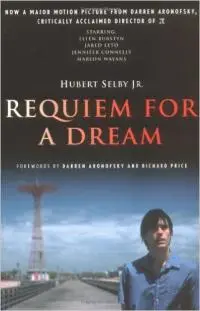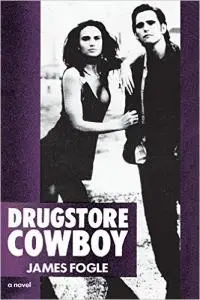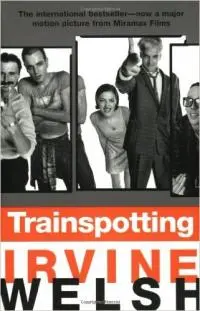The war on drugs, a battle which had fitfully sputtered in a series of minor conflicts since around 1914, finally roared into life in 1968, when Lyndon Johnson, alarmed by the Summer of Love and anxious to distract an increasingly anxious population from the war in Vietnam, decided to bolster his appeal with Middle America by cracking down on illegal drug use. To justify this use of resources and manpower, he needed a shroud to shake at potential voters — a dreadful warning about what would happen if he didn’t act.
In 1968, the junkie shambled from the dark corner of medical literature to which it had been confined since the early 20th century and into the spotlight of popular culture. It says something about the potency of this archetype that we have been writing about junkies ever since.
The junky — ravaged, dissolute, seductive — stalks the dirty streets of many, many books. A real-life counterpart to the zombie, junkies both frighten and fascinate us. Junkies are human, yet also not human. They are possessed of raging desires and needs which make them do things that the rest of us publicly denounce, yet privately lust after. Junkies are degraded, yet also liberated from the complications of a normal life. They want one thing and are prepared to do almost anything to get it. We’re horrified at the degradation, yet attracted by the awful simplicity of their daily existence.
Or at least we are in theory, when we meet junkies between the pages of a book. Fictional junkies are no closer to reality than fictional dragons. As writers we use them to make a metaphorical point. How and why we use them varies from story to story. Here are three classics of the junky genre, each of which have different things to say about their subject matter and, possibly, about the rest of us too.
'Requiem for a Dream' by Hubert Selby Jr.
Selby, disabled by a chronic lung condition (which also caused his addiction to heroin), started writing because it gave him something to do when he wasn’t looking after his school-age daughter. Many Dads in that situation might do a Mo Willems and turn out something whimsical and charming like Time to Pee!, but Selby chose instead to go down a different, dark road. The stories he came up with, based on his experiences growing up in Brooklyn in the 1930s and 40s, are so dark and disturbing in their immediacy and sense of veracity, that to read them is like taking a tour of the sewage system of your house. You know this world exists, you have a vague longing to find out if it’s really as horrible as you think it is, and afterwards you have a really strong need to take a very long shower.
 Requiem for a Dream came out in 1978. It follows the story of Harry Goldfarb, small time drug dealer, who along with his friend Tyrone C Love, attempts to move up a gear financially with the purchase of a big heroin score. The idea is to make some money, to fund his girlfriend Marion’s dream of owning a chain of art cafes. At the same time, Harry’s mother Sara decides to lose weight, convinced by a random recruitment call for a quiz show that she’s about to appear on TV. Her method involves the use of ‘diet pills’, or to call a spade a spade, amphetamine.
Requiem for a Dream came out in 1978. It follows the story of Harry Goldfarb, small time drug dealer, who along with his friend Tyrone C Love, attempts to move up a gear financially with the purchase of a big heroin score. The idea is to make some money, to fund his girlfriend Marion’s dream of owning a chain of art cafes. At the same time, Harry’s mother Sara decides to lose weight, convinced by a random recruitment call for a quiz show that she’s about to appear on TV. Her method involves the use of ‘diet pills’, or to call a spade a spade, amphetamine.
As Selby explains in his introduction, there’s a difference between having a vision and having a dream. Visions are motivating — Selby himself experienced one in his early adulthood, in the form of a deep and painful realization that if he went through life without having learned how to write, he would go to his death regretting it. Dreams are different. Dreams are the things we want because everyone else wants them. The junkies in Requiem for a Dream are addicted to drugs, but also to their dreams — fame, easy money, indolence. A vision includes an understanding of what needs to be done to achieve the vision. A dream skips that part and heads straight for the closing credits — us on the stage clutching an Oscar, us on the red carpet while the flashbulbs pop, us on the yacht while rainbow coloured dolphins bob in the water alongside.
It doesn’t work out well for Harry, Tyrone, Marion and Sara. The junkies in this book represent the child in all of us, and by that I don’t mean an undamaged sense of wonder and ability to see the beauty in the world around us. Selby’s characters haven’t figured out that wanting what most people want is a cheap substitute for going after what you really want. They become addicted to a dream of success. Drugs allow them to sustain the fantasy.
In this quote, Marion, who has started fucking her dealer Big Tim in exchange for heroin, has a moment of remembering her plans with Harry.
Occasionally Marion would notice her sketch pads and pencils and the memory of the plans for the coffee house and some other vague memories started to work their way to her consciousness, but she just pushed them aside and stared at the tube, thinking about her stash.
'Drugstore Cowboy' by James Fogle
Drugstore Cowboy is something of a literary anomaly. Fogle wrote the book while serving a twenty year stretch for burglary. He had already formed a friendship with the writer and director Daniel Yost, who had edited and attempted to sell one of Fogle’s earlier works, without success. With Fogle’s agreement, Yost wrote a screenplay based on the manuscript and got Gus van Sant interested in directing. It was only after the movie came out, that Drugstore Cowboy found a publisher. Before that, Yost says, no one would touch it with a bargepole. It was too raw. Too tough.
 Well maybe. It’s hard to imagine that an industry that would embrace Selby’s work complete with lesbian porn, amputation and shock treatment, would recoil in horror from Drugstore Cowboy’s much less visceral take on life as an addict. A more likely reason is probably that Fogle was a less gifted writer than Selby, but that said Drugstore Cowboy has a rough headlong energy that makes it a compelling and weirdly endearing read.
Well maybe. It’s hard to imagine that an industry that would embrace Selby’s work complete with lesbian porn, amputation and shock treatment, would recoil in horror from Drugstore Cowboy’s much less visceral take on life as an addict. A more likely reason is probably that Fogle was a less gifted writer than Selby, but that said Drugstore Cowboy has a rough headlong energy that makes it a compelling and weirdly endearing read.
The story is more or less autobiographical. Bob Hughes and his henchpeople Dianne, Nadine and Rick, rob their way across America. Their preferred target is drugstores, where they have perfected a series of techniques for filching a wide range of narcotics from under the noses of storekeepers. Their activities draw them to the attention of the cop Gentry, who makes it his personal mission to bring them in.
Bob Hughes is a junky, but of a very different kind to the hapless losers of Requiem for a Dream. Bob is organized, professional, driven. He knocks off pharmacies even when his stash is rattling with pills, because he likes to keep busy and burglary is his métier. Drugstore Cowboy is a story about people on the run and here the junky is the perpetual outsider, constantly at odds against authority, with addiction the engine that drives their campaign against the powers that be. You get the sense that Bob’s need for heroin is secondary to his need to fuck shit up, that his real motivation lies in pissing off the cops, particularly his arch-enemy Gentry, not in feeding his habit.
Here, Dianne loses her patience with Bob’s endless scheming:
You’re crazy Bob, do you know that? You ain’t fucked me in a month and you’re crazier than a shithouse rat. You ain’t got a lick of sense. We just pulled off two of the best scores we’ve made in months and off you trot looking to find more. Don’t you know when to take a break?
Breaking the law can become an addiction in its own right. Even after the success of Drugstore Cowboy and his elevation to Bad Boy Writer du jour, Fogle continued to rob pharmacies, pulling off his last job in 2011. He died in prison in 2012.
'Trainspotting' by Irvine Welsh
Written in a vernacular thicker than the concrete encasing Jimmy Hoffa’s body, in 1993 Trainspotting was launched on an unsuspecting reading public like a Trident missile raining sweary words. It tells the story of Mark Renton and his crew of familiars as they swill, snort, shag and spike their way through Edinburgh in the Thatcher-blighted 80s and probably needs no longer introduction than that, because it’s sold about a billion trillion copies (Welsh himself describes it as a ‘cash cow’) and is probably more famous than Jesus.
 Like Drugstore Cowboy, the junkies in Trainspotting like cocking a snook at The Man, preferably several snooks followed by a brick through the front window of The Man’s tidy suburban bungalow. But they’re not outsiders like Bob Hughes, dedicated to a renegade way of life. Renton et al aren’t like Shelby’s junkies either — medicating themselves against the gap between their dreams and harsh reality. Trainspotting is at heart a work of sociology, an investigation of what happens when the brickwork of society crumbles under the assault of ideology and economic downturn. Welsh’s junkies are junkies because they don’t have anything else better to do. Addiction gives their lives meaning, structure and purpose. It gives them a reason to get out of bed in the morning. Smack is their career, with defrauding the Kafkaesque benefits system by any and all means possible a useful secondary profession. This junky represents the junky in all of us, the person we all could be if life had dealt us a different hand of cards, and it's this which makes Trainspotting so much more disturbing than either the degradation of Requiem for a Dream or the brutality of Drugstore Cowboy. We can’t sit on the sidelines like addiction tourists, nestled in the knowledge that this stuff happens to other people. The junkies in Trainspotting are recognizable. We pass them in the street every day. Reading about them hammers home a painful message we’d all much prefer not to hear: that we’re all only one factory closure away from the needle and the spoon.
Like Drugstore Cowboy, the junkies in Trainspotting like cocking a snook at The Man, preferably several snooks followed by a brick through the front window of The Man’s tidy suburban bungalow. But they’re not outsiders like Bob Hughes, dedicated to a renegade way of life. Renton et al aren’t like Shelby’s junkies either — medicating themselves against the gap between their dreams and harsh reality. Trainspotting is at heart a work of sociology, an investigation of what happens when the brickwork of society crumbles under the assault of ideology and economic downturn. Welsh’s junkies are junkies because they don’t have anything else better to do. Addiction gives their lives meaning, structure and purpose. It gives them a reason to get out of bed in the morning. Smack is their career, with defrauding the Kafkaesque benefits system by any and all means possible a useful secondary profession. This junky represents the junky in all of us, the person we all could be if life had dealt us a different hand of cards, and it's this which makes Trainspotting so much more disturbing than either the degradation of Requiem for a Dream or the brutality of Drugstore Cowboy. We can’t sit on the sidelines like addiction tourists, nestled in the knowledge that this stuff happens to other people. The junkies in Trainspotting are recognizable. We pass them in the street every day. Reading about them hammers home a painful message we’d all much prefer not to hear: that we’re all only one factory closure away from the needle and the spoon.
This passage lays bare Renton’s mode de vie.
What he did, at least work-wise, was nothing. He was in a syndicate which operated a giro fraud system, and he claimed benefit at three different addresses, one each in Edinburgh, Livingston and Glasgow and two in London, at Shepherd’s Bush and Hackney. Defrauding the Government in such a way always made Renton feel virtuous, and it was difficult to remain discreet about his achievements. He knew he had to though, as sanctimonious, self-righteous, nosy bastards were everywhere, just waiting to tip off the authorities. Renton felt he deserved this money, as the management skills employed to maintain such a state of affairs were fairly extensive, especially for someone struggling to control a heroin habit.
For a man who doesn’t work, Renton is a highly industrious fellow.
Those are the uses to which we put Johnson’s invention — as a metaphor to capture our immaturity, our need to rebe,l and our inventiveness in finding ways to survive an unsurvivable life. That’s fiction. Real junkies are nothing like the ones we find in books. Take one example: for years, Congress harboured a junky, a man who enjoyed a blameless reputation for most of his career and who devoted himself to protecting America from subversives. This man got his supply of smack from the Head of the Federal Bureau of Narcotics, Harry Anslinger. His name was Senator Joe McCarthy.

About the author
Cath Murphy is Review Editor at LitReactor.com and cohost of the Unprintable podcast. Together with the fabulous Eve Harvey she also talks about slightly naughty stuff at the Domestic Hell blog and podcast.
Three words to describe Cath: mature, irresponsible, contradictory, unreliable...oh...that's four.








